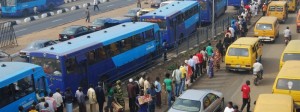I have heard that when you have a complaint concerning Lagos and governmental services rendered, and you voice it succinctly, the state will most likely listen and attend to it. Eko o ni baje o! That is commendable. In that vein, I have come to table this matter before our elders. I had an experience some days ago that I consider quite funny, but perhaps, maybe not so funny when viewed from a different perspective. As I type this story, I am chuckling in disbelief. Thoughts like ‘can you imagine?!’ and ‘what nonsense?’ are floating around my head, but eventually I would let you answer that. First of all, allow me to introduce myself.
I am a corps’ member on national service; the kind that has to fly to Abuja to get registered and ticks the ‘foreign student’ box on the different forms at the orientation camp. When, one day, I showed a picture of myself clad in white vest and green khaki pants to my oyinbo friend, she shook her head in awe as I explained to her the reason behind my garb. “Wow, you must really love your country,” she said. I beamed with pride at her exclamation toward the love for my country. I do; though my knowledge of ‘my country’ hardly stretches beyond Lagos, I love it nevertheless. However, due to a recent turn in events, I can only come to the conclusion that it seems my ‘country’ does not love me back.
It was a very sunny afternoon. I had just closed for the day at work and was standing in on a queue for a BRT bus heading to Oshodi. This was during the dreaded rush hour, and as such the queue was long and the fact that buses trickled in did not help ameliorate the situation. After a long wait, I finally got to a position on the line that would guarantee me a seat on the next batch, and that was when my wahala started. The weather suddenly changed. The sun that had been burning my back gave way to a cool breeze, which gradually became a fierce wind. Leaves started to flap and rustle wildly, and cars started honking impatiently. People that were sitting down on the curb quickly got up and started fighting for space on the line, and everybody generally got anxious. Finally, a bus came, and I hurriedly handed my ticket to the conductor and climbed in.
I was hit with a pleasant surprise. A crisp, clean smell, muted noise and closed windows; the bus had air-conditioning. Grinning like a queen, I picked a cushiony seat and settled in, revelling in the gasps and cries of subsequent passengers as they trooped in. “Ah, A.C dey” they commented, wide-eyed in disbelief. However, our happiness was to be short lived! Before we could say ‘Jack Robinson’, our driver had quickly jumped down from his seat and started aggressively opening windows. When we inquired the reason for his sudden action, he promptly informed us that we were going to Oshodi, therefore, we were not good enough for the air conditioning system.
I was filled with sadness instantly. Everyone on the bus also seemed to be saddened by this turn of events. A wave of quietness enveloped the bus, and I could hear people silently rethinking their lives. Air condition was not our portion, as children of the Mainland, the other part of the state across the Lagos Lagoon. We were not worth the gas. Even when the rain started falling and we had to close the windows to keep the water out, the driver let us bask in the steamy atmosphere as a result of the perspiration building up in the bus. I looked out forlornly at lucky people who had their own cars, and, perhaps, did not know what it meant to be deprived of basic human rights, like air-conditioning, which was pre-paid for from our bus-tickets.
After I got home and had eaten, I started to rethink the whole event. Anger and indignation began to swell in my chest. No! I fumed. I would not be defeated. I am a writer, and the revulsion I felt as a result of deprivation awakened a spirit that would not be dampened. This was injustice. This was segregation, and right in my country, meted out by my fellow Nigerian.
We were only a bus of commuters, and a bus full of people is only a minute fraction of the national population. But if nobody fights for the rights of these people, who will? Segregation is wrong, and should be eliminated wherever it is found, with whatever means at our disposal. Eko o ni baje O!



